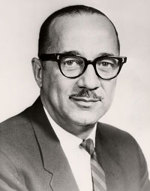Establishing the Fellowship
For over 50 years, the University of Wisconsin Law School's William H. Hastie Fellowship Program has provided aspiring scholars an outstanding opportunity to prepare for a career in law teaching.

The University of Wisconsin established the Hastie Fellowship in 1973. It honors William H. Hastie (1904-1976), a lawyer, teacher, jurist and civil rights advocate who championed the importance of high-quality legal education.
University of Wisconsin Law School Professor James E. Jones, Jr. (1924-2014), well-known as a leading expert in labor law and as the architect of several significant programs aimed at achieving greater racial equality in the work force, was a moving force in creating this program.
The Fellowship began as an effort to address discrimination and the lack of diversity in the legal academy. It reflects an ongoing commitment to pathways for law professors who bring a wide range of identities, backgrounds, experiences and perspectives to the classroom.
About the Program
The Hastie Fellowship is a two-year program. Fellows pursue a scholarly agenda of their choice, typically prepare two pieces for publication, and receive mentoring in both their teaching and scholarly work.
Interdisciplinary Scholarship
The Fellowship Program promotes scholarship in the full range of law studies. Wisconsin has a particularly strong tradition supporting studies of the law in action and interdisciplinary work. Fellows are encouraged to take full advantage of long-established ties between the law faculty and faculty in other disciplines, and they will have access to the vast resources of the entire University.
Hastie Fellows devote the majority of their time to their own research agenda, researching and writing scholarly articles with support from a faculty advisor and the Hastie Fellowship Committee. Typically, a Fellow prepares two publishable articles during their time in residence, and relies upon these articles in their applications for law teaching positions.
Mentorship
Each Hastie Fellow, before beginning work, establishes a relationship with a faculty member who will serve as the Fellow's principal research advisor.
The fellow may also be paired with a second mentor and will have many opportunities to engage with additional members of the faculty, including members of the Hastie Fellowship Committee.
Another important aspect of the Hastie Fellowship Program is helping each Fellow develop strong teaching skills. Fellows have opportunities to observe teaching in their subjects of interest and discuss strategies with faculty members. In addition, Fellows typically elect to teach a course or seminar in their area of interest in the second year of the program.
Community Integration
Fellows are also expected to participate in the rich intellectual and social community of the Law School. We welcome Fellows to:
- attend faculty workshops, colloquia, and social gatherings;
- engage with the many scholars and public officials who visit the Law School each year; and
- participate in a range of student-sponsored activities.
